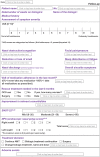Assessment of chronic rhinosinusitis with nasal polyps: Development of the Nasal Polyp Patient Assessment Scoring Sheet tool
- PMID: 38803462
- PMCID: PMC11129554
- DOI: 10.1002/lio2.1277
Assessment of chronic rhinosinusitis with nasal polyps: Development of the Nasal Polyp Patient Assessment Scoring Sheet tool
Erratum in
-
Correction to "Assessment of Chronic Rhinosinusitis With Nasal Polyps: Development of the Nasal Polyp Patient Assessment Scoring Sheet Tool".Laryngoscope Investig Otolaryngol. 2025 May 24;10(3):e70137. doi: 10.1002/lio2.70137. eCollection 2025 Jun. Laryngoscope Investig Otolaryngol. 2025. PMID: 40416777 Free PMC article.
Abstract
Background: Chronic rhinosinusitis (CRS) is a heterogeneous disorder with a wide range of validated subjective and objective assessment tools to assess disease severity. However, a comprehensive and easy-to-use tool that integrates these measures for determining disease severity and response to treatment is still obscure. The objective of this study was to develop a standardized assessment tool that facilitates diagnosis, uniform patient monitoring, and comparison of treatment outcomes between different centers both in routine clinical practice and in research.
Methods: To develop this tool, published literature on assessment tools was searched on various databases. A panel of 12 steering committee members conducted an advisory board meeting to review the findings. Specific outcome measures to be included in a comprehensive assessment tool and follow-up sheet were then collated following consensus approval from the panel. The tool was further validated for content and revised with expert recommendations to arrive at the finalized Nasal Polyp Patient Assessment Scoring Sheet (N-PASS) tool.
Results: The N-PASS tool was developed by integrating the subjective and objective measures for CRS assessment. Based on expert opinions, N-PASS was revised to be used as an easy-to-use guidance tool that captures patient-reported and physician-assessed components for comprehensively assessing disease status and response to treatment.
Conclusion: The N-PASS tool can be used to aid in the diagnosis and management of CRS cases with nasal polyps. The tool would also aid in improved monitoring of patients and pave the way for an international disease registry.
Level of evidence: Oxford Level 3.
Keywords: EPOS; SinoNasal Outcome Test; assessment; biologics; consensus; control; diagnosis; eosinophilic; nasal polyps; outcome measure; rhinosinusitis; scoring sheet; sinusitis; type 2.
© 2024 The Author(s). Laryngoscope Investigative Otolaryngology published by Wiley Periodicals LLC on behalf of The Triological Society.
Conflict of interest statement
Saad Alsaleh received honoraria from Sanofi and GSK for lectures and advisory board activities. Nehal Kamal, BS Pharm, is an employee of Sanofi and may hold shares and/or stock options in the company. Claire Hopkins has done advisory board work for Sanofi, GSK, Lilly, and Astra Zeneca. Omar Abu Suliman has been involved in advisory board work for Sanofi and GSK. Naif H. Al‐Otaibi has received advisory board fees and honoraria for lectures from Sanofi and GSK. Joseph K. Han is a research consultant for Sanofi Regeneron GSK AZ and Genentech. Amin Javer is a speaker/consultant for GSK, Sanofi Regeneron, iView Therapeutics, and SaNOtize. Ahmad R. Sedaghat has been involved in research funding and advisory board participation for Sanofi/Regeneron and GSK. Philippe Gevaert declares he has received lecture fees and/or participation at expert board meetings from ALK‐Abelló, Argenx, AstraZeneca, Genentech, GlaxoSmithKline, Novartis, Regeneron, Roche, Sanofi, and Stallergenes Greer. The remaining authors declare no conflicts of interest.
Figures




References
-
- Sedaghat AR. Chronic rhinosinusitis. Am Fam Physician. 2017;96(8):500‐506. - PubMed
-
- Fokkens WJ, Lund VJ, Hopkins C, et al. European position paper on rhinosinusitis and nasal polyps 2020. Rhinology. 2020;58(suppl S29):1‐464. - PubMed
-
- Fokkens WJ, Lund VJ, Mullol J, et al. European position paper on rhinosinusitis and nasal polyps 2012. Rhinol Suppl. 2012;23:3‐298. - PubMed
-
- Oykhman P, Paramo FA, Bousquet J, Kennedy DW, Brignardello‐Petersen R, Chu DK. Comparative efficacy and safety of monoclonal antibodies and aspirin desensitization for chronic rhinosinusitis with nasal polyposis: a systematic review and network meta‐analysis. J Allergy Clin Immunol. 2022;149(4):1286‐1295. doi: 10.1016/j.jaci.2021.09.009 - DOI - PubMed
LinkOut - more resources
Full Text Sources
Research Materials
